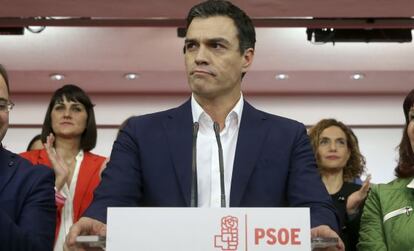Socialists confirm they will vote ‘no’ to Rajoy as prime minister
PP and C's pressure PSOE not to block investiture as maneuvering to form government begins

After the general election failed to produce a strong enough winner to create an easy majority in Congress, Spain’s political parties on Monday began the chess game of crafting alliances with likely, and even unlikely, partners.
But the highly fragmented picture left after Sunday’s ballot leaves no easy answers about who will govern the country for the next four years.
What’s at stake here is the stability of Spain”
Fernando Martínez Maillo, PP official
Although Prime Minister Mariano Rajoy’s Popular Party (PP) won the election, its 123 seats are not enough to form a majority government.
The Socialist Party (PSOE), which came in second, will not be supporting Rajoy’s bid for a second term in office.
Socialist leader Pedro Sánchez, who secured 90 deputies, said on Monday that he was not willing to back Rajoy’s nomination at the investiture vote coming up next month.
“The PSOE will act with prudence and responsibility, and it is up to the PP to try to form a government,” said the Socialist organization secretary, César Luena. “But the PSOE will vote no at the investiture of Mariano Rajoy.”
Meanwhile, emerging party Ciudadanos, which obtained 40 deputies, said it would abstain rather than actively vote for Rajoy, in a bid to unblock the investiture vote. Its leader Albert Rivera asked the Socialists to do the same.
Brussels asks for stability
Brussels has reacted to the results of the Spanish general election with extreme caution, calling for a “stable government despite all the difficulties,” according to a European Commission spokesperson.
The Commission has sent Rajoy a letter congratulating him on his victory at the polls.
“The Popular Party is the main party and the others did what they did,” said Commission President Jean-Claude Juncker at a brief press conference.
On Monday, the markets reacted nervously to the political instability that could ensue following a highly fragmented vote.
“The ball is in Pedro Sánchez’s court,” said Rivera, who wondered whether Sánchez would allow a minority government with an approved budget to govern Spain, or whether he would instead try to form a government of his own “or something like it” with 11 parties.
If the Socialists, despite the worst results in their own history, attempt a coalition government with groups such as Bildu – the radical Basque abertzale leftist coalition – it would be “the worst thing the PSOE has done in the last 30 years,” he said.
And neither are the other parties with congressional representation likely to extend Rajoy a helping hand.
This leaves Rajoy in a difficult position that could even mean giving way to a different conservative nominee who might attract greater consensus.
In any case, even if they wanted to, it is unclear whether the Socialists would be able to build an alternative majority by adding the votes of the anti-austerity Podemos – which, with its alliances in Catalonia, Valencia and Galicia, came in third with 69 seats – the United Left (2), and regional parties such as the Catalan Republican Left (ERC), the Basque Nationalist Party (PNV) and even Bildu (2).
The Socialists and Podemos are deeply divided over Catalonia, where the former defends a new model that would grant the region greater self-rule but fall short of independence and the latter wants to hold a legal referendum to let Catalans decide on whether or not they should split from Spain.
Podemos has also been the Socialists’ greatest rival at this election, attracting the votes of many disgruntled progressives to the detriment of the PSOE.
Regional Socialist leaders have already warned against any deal “that is just a pastiche,” in the words of Castilla-La Mancha regional premier Emiliano García-Page.
In the meantime, Podemos leader Pablo Iglesias is trying to prevent an unlikely but possible grand coalition between the PP and the PSOE.
“Either we realize that Spain is a diverse country with a plurality of nations or we are giving away the government to the PP, which came in sixth in Catalonia and fifth in the Basque Country,” he said. “I am worried that the PSOE might want a grand alliance with the PP.”
The election winner, for his part, is remaining coy about whether he wants the Socialists to abstain or join the PP in a grand coalition that would be entirely unpredecented in the history of democratic Spain.
But so far, nothing is being entirely ruled out.
“What’s at stake here is the stability of Spain,” said the PP’s deputy organization secretary, Fernando Martínez Maíllo.
English version by Susana Urra.
Tu suscripción se está usando en otro dispositivo
¿Quieres añadir otro usuario a tu suscripción?
Si continúas leyendo en este dispositivo, no se podrá leer en el otro.
FlechaTu suscripción se está usando en otro dispositivo y solo puedes acceder a EL PAÍS desde un dispositivo a la vez.
Si quieres compartir tu cuenta, cambia tu suscripción a la modalidad Premium, así podrás añadir otro usuario. Cada uno accederá con su propia cuenta de email, lo que os permitirá personalizar vuestra experiencia en EL PAÍS.
En el caso de no saber quién está usando tu cuenta, te recomendamos cambiar tu contraseña aquí.
Si decides continuar compartiendo tu cuenta, este mensaje se mostrará en tu dispositivo y en el de la otra persona que está usando tu cuenta de forma indefinida, afectando a tu experiencia de lectura. Puedes consultar aquí los términos y condiciones de la suscripción digital.









































